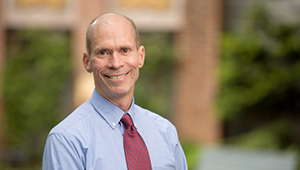What inspires Dr. Greg Simon to study mental health?

For 27 years the psychiatrist-scientist has been researching, developing, and testing innovative population-based mental health programs.
We asked these five questions of Greg Simon, MD, MPH , a practicing psychiatrist at Kaiser Permanente Washington and a senior investigator at Kaiser Permanente Washington Health Research Institute.
What got you interested in mental health?
As a first-year medical student, I took a personality test that predicted I would end up a psychiatrist. I just laughed at how silly that was. But my clinical rotations convinced me that psychiatry really is the most interesting part of medicine, so the laugh ended up being on me.
What spurred you to do research about mental health?
I grew up in Louisiana, studied in Texas and North Carolina, and caught the public health research bug in the Robert Wood Johnson Clinical Scholars program at the University of Washington.
During that training program, I met Ed Wagner and Michael Von Korff at what was then the Center for Health Studies at Group Health Cooperative — later Group Health Research Institute and now Kaiser Permanente Washington Health Research Institute. Ed was the center’s founding director, and Michael is a senior investigator who became my close collaborator. Ed and Michael were some of the first people to imagine population-based mental health care — considering everyone in need of care rather than just people already receiving care.
I was drawn into that vision, and I’ve stayed for 27 years, developing and testing various population-based mental health programs for the members of Group Health and now Kaiser Permanente.
What excites you most about the research you’re doing now?
I am excited about doing the research our members need, and ensuring that our research findings are really changing practice. Our work on suicide prevention is probably the best example of that. Kaiser Permanente has become a national leader — in both research and quality improvement — in suicide prevention. And we’ve developed ways to provide flexible, patient-centered psychotherapy programs organized around peoples’ preferences and values and delivered using 21 st-century tools, so patients can engage as they want to engage.
I’ve been leading the Mental Health Research Network for the past several years. The MHRN, part of the Health Care Systems Research Network, is national resource for research: a consortium of 13 health system research centers (including seven Kaiser Permanente centers), embedded in large and diverse health care systems.
Supported by the National Institute of Mental Health, the network is dedicated to improving patients’ mental health through research, practice and policy. Our multidisciplinary researchers have expertise not only in mental health research but also in epidemiology, health services, economics, disparities, pragmatic clinical trials, and outcomes and quality assessment. It’s all about collaboration, and we’re always ready to partner with new people and explore new ideas.
Any advice for the public around Mental Health Month?
Mental health and mental health care are less complicated and mysterious than most people think. Psychiatrists and therapists don’t read minds, so you do have to tell them what you’re thinking and feeling. The things they suggest won’t be a big surprise. It’s all about sticking with it.
What do you like to do in your spare time?
I’m a skiing fanatic, so that puts me out of sync with most Seattleites’ weather woes. When it’s yet another rainy 40-degree day in the city, I’m eagerly checking how fast the snow is piling up in the mountains. That’s what cognitive therapists call a reframe.
risk assessment

Suicide prevention: Research network finds new way to predict risk
A study led by KPWHRI researches uses machine learning to determine which patients are in greatest need of intervention.
Honors

Dr. Greg Simon wins national suicide prevention award
Kaiser Permanente physician-scientist will receive American Foundation for Suicide Prevention’s Lifesavers Research Award.


